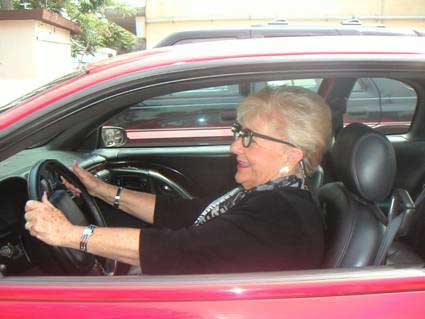
Driving With Macular Degeneration
Driving With Bioptic Glasses for Macular Degeneration
For many, being able to drive contributes to feelings of freedom and independence. As long as you can move around on your own and decide when to go where, you feel in control of your life. For this reason, driving is one of the primary concerns for people with Age-Related Macular Degeneration (AMD). As vision declines, the question "How long will I be able to keep my driver's license?" emerges.
Our dedicated staff at The Low Vision Center at Family Eyecare Center of Optometry have helped AMD patients keep their licenses and maintain personal freedom. Contact Dr. Harold Ashcraft today to receive the highest level of vision care and see your life change for the better.
How Does Macular Degeneration Affect Driving?
Macular Degeneration is a progressive disease. The initial symptoms include distorted central vision or a blurry spot in the center of the visual field; contrasts become more difficult to discern and colors may fade. At this point, you will find it more challenging to read road signs, drive at night or drive in conditions of poor visibility.
In more severe cases of AMD, the central area of the visual field eventually turns into a blind spot. Though one can still see the street and their surroundings using their side vision, seeing traffic signs and traffic lights becomes almost impossible.
Not only do patients begin to feel uneasy on the road, but may also no longer be permitted to drive.
 Can I Still Drive If I Have Macular Degeneration?
Can I Still Drive If I Have Macular Degeneration?
Many patients with vision loss due to AMD can continue to drive with the help of low vision aids. Whether this is possible for you depends on many factors, such as the severity of your vision loss and the local DMV driving laws in your region.
If you feel that your vision prevents you from driving safely and you fear losing your driver's license, contact Dr. Harold Ashcraft to assess your vision and your visual needs. Low vision optometrists have a thorough knowledge of the vision requirements of the DMV in your area, and can fit you with custom vision aids and devices that may enable you to drive safely.
Low Vision Optometrists Help AMD Patients to Drive
Our low vision eye doctor will conduct a thorough low vision exam to determine your individual needs. The optometrist will then offer you different low vision aids that may enable you to stay behind the wheel, working closely with you to find the best solution.
There are many types of low vision aids. These include a variety of low vision glasses, hand-held stationary magnifiers, special lighting, advanced hi-tech equipment, cell phone apps, and many more. When driving, you need a hands-free device, so low vision aids in the form of eyeglasses are ideal. The most frequently used are bioptic telescope glasses.
Bioptic Lenses
Bioptic telescope glasses are intended to enhance distance vision for patients with adequate side vision but with mild to moderate central vision loss. A pair of bioptic telescope lenses is placed on the lenses of your regular prescription eyeglasses, just above the normal line of sight. When looking through the bioptic lens, distant objects appear larger and closer, allowing patients to read road signs and see traffic lights at a distance – all with a slight downward tilt of the head and an upward shift of the eyes.
Driver's License Requirements
Every state and province has its own regulations regarding the minimum visual acuity required for issuing an unrestricted or restricted drivers' license. Once issued, the license indicates whether the driver needs to wear corrective lenses (glasses, contact lenses, or low vision glasses) to reach legal driving vision. A restricted license limits driving to daylight hours and to certain locations, which may suffice for certain people with Macular Degeneration.
How a Low Vision Eye Doctor Can Help
After a low vision exam, the low vision optometrist may prescribe a custom made pair of bioptic lenses and will provide the necessary consultation and training on how to use them. The eye doctor might also refer you to a driver rehabilitation professional who will help you improve your driving skills and make sure you feel safe and comfortable with your new low vision aid while on the road.
Learn from an experienced low vision optometrist, such as Dr. Harold Ashcraft, about all the solutions available to get you back behind the wheel. Contact us today to maximize vision functionality and maintain your independence.
The Low Vision Center at Family Eyecare Center of Optometry helps patients from Los Angeles, Westchester, Inglewood, and Playa Del Rey, in California, regain lost vision.